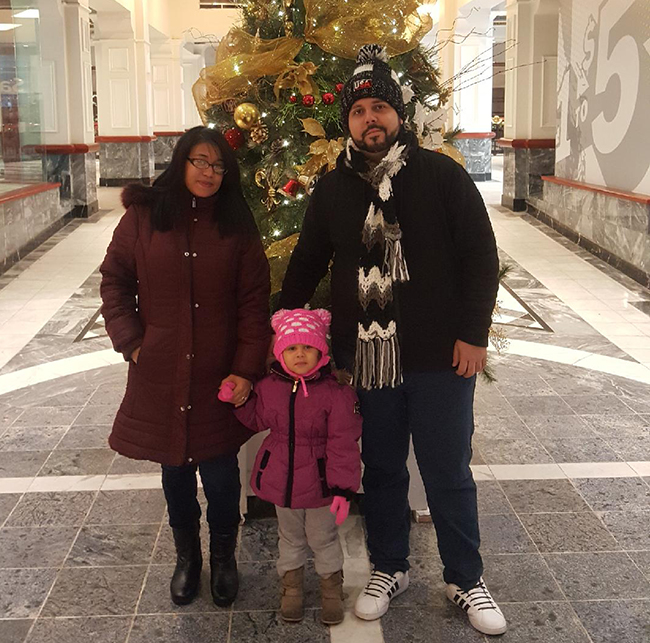The Ortiz family of Carolina Puerto Rico, now make their home in Jersey City, New Jersey.
A week after Angel Ortiz moved from Puerto Rico to Philadelphia, Hurricane Maria hit the island, with his wife and daughter still living in their northern hometown of Carolina.
“When Hurricane Maria passed through, everything changed,” Ortiz said. “I spent three days without knowing how they were.”
Ortiz’s wife and young daughter didn’t meet him in Philadelphia until Nov. 9. They were put in emergency housing provided by FEMA — the Federal Emergency Management Agency — and started working through welfare programs.
But on Jan. 13, they got a call from the agency.
“(FEMA) said no more, and that we needed to move,” Ortiz said. “They said our house was determined to be livable in Puerto Rico, so we couldn’t stay in FEMA housing anymore.”
Although the Ortiz’s house was deemed livable by the federal agency, Ortiz said widespread looting, a lack of reliable electricity and the weakened healthcare system have kept them in the states.
“Some hospitals are still running on generators,” he said. “My daughter got the pneumonia down there and they checked on her just once a day to control the asthma.”
Since getting removed from FEMA housing, the family moved to Jersey City, where they’re staying with Ortiz’s grandmother.
And they are just one of more than 40 Puerto Rican transplants that landed in Hudson County, New Jersey as a direct result of Hurricane Maria, according to the Jersey City Board of Education.
With a wave of Puerto Rican families moving to the area, community groups like Project PIEDRA (Professionals in Education Delivering Relief Assistance) are helping them in the transition to life in the states.
The organization connects Puerto Rican families like Angel’s to each other, along with other community resources.
Project PIEDRA is the brainchild of Francisco Santiago, a teacher in Jersey City’s public school system.
“When the hurricane hit the island, I looked at my wife and said, ‘babe, we got to do something. Let’s sell the house and move down there,” Santiago said.
But the couple settled on fundraising first, and they’ve been helping displaced families transition to new lives in Jersey in the meantime.
With an education-focused model, Project PIEDRA is also helping the educational system on the island.
Santiago said the group is engaged in talks with the Puerto Rican Department of Education about what schools need their help the most.
“We’re really focused on getting boots on the ground,” Santiago said. “Teachers also got his by this tragedy; they have homes they need to return to so we want to be a respite for them, whether it’s for a day or a week.”
The organization involves teachers, administrators, counselors and social workers, and the group plans to help out schools in every aspect, said William Diaz, Vice Principle at Fort Lee High School in Fort Lee, New Jersey.
“There has been a disruption in the educational process on the island, so the goal is to go there and support in any way possible,” Diaz said.
Diaz said most of his own family also remains on the island.
“When they suffer through what they’re going through, it has a big impact on me,” he said. “I’m not an electrician or a carpenter, but I can help through education.”
The group is currently in talks with corporate vendors to secure ongoing funding. Santiago said the long-term goal for the organization is to be a volunteer relief program for any area needing educational assistance — not just Puerto Rico.
“If something happens next year in, let’s say, Haiti, we want to be there too,” Santiago said. “Wherever we’re needed, that’s where we want to be.”
And as for Ortiz, he said his family has no plans to return to the island.
“I don’t care if I’m here, or back in Philadelphia or in any part of the United States,” Ortiz said. “I just want to work hard and have a better place in life for me and my family.”


